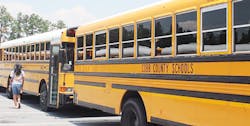New buses in Cobb County (Ga.) district will have air conditioning
After a record-setting heat wave brought 90-degree days that stretched into October, the Cobb County (Ga.) School Board has decided that any new buses bought in the future will be equipped with air conditioning.
The Atlanta Journal-Constitution reports that the board has approved the immediate purchase of the nine buses with air conditioning for $895,758. Five 72-passenger traditional buses and four 48-passenger buses for special needs students would be added to the district’s overall bus fleet.
Very little of the district's existing fleet includes air conditioning; Superintendent Chris Ragsdale says the district will not consider retrofitting existing buses to add air conditioning.
“That’s totally off the table,” he said.
The priority will be to replace special education buses that do not have air conditioning.
Over the next four years, the school district plans to spend about $21 million to replace 123 regular and 89 special education buses with vehicles that have air conditioning.
Marc Smith, the district's chief technology & operations office, says the district has 1,110 buses—831 traditional buses and 279 special education buses. It will take at least 15 years to replace the entire bus fleet.
Smith says the school system will prioritize air conditioned buses for routes that carry “medically fragile students” and students with disabilities. Buses that travel long routes or that are at full capacity also will be among the first to get cooling.
The typical bus ride for regular education students is between 25 and 30 minutes, Smith says. Special education students might ride anywhere from 50 minutes to 1 hour, 45 minutes.
About the Author
Mike Kennedy
Senior Editor
Mike Kennedy, senior editor, has written for AS&U on a wide range of educational issues since 1999.
